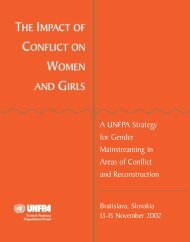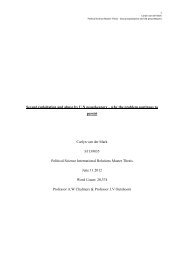Stop Sudah English-revised-March2012 - International Center for ...
Stop Sudah English-revised-March2012 - International Center for ...
Stop Sudah English-revised-March2012 - International Center for ...
Create successful ePaper yourself
Turn your PDF publications into a flip-book with our unique Google optimized e-Paper software.
When “Father” was in jail . . . I took a boat to Sorong with my children and I was pregnant. In [one place] . . . I<br />
saw people running scared . . . into the <strong>for</strong>est, to the opposite island, and the army was shooting them. Once in Sorong,<br />
I got the news that my home and the homes of other villagers . . . had been burned by the army . . . For two years . . .<br />
[people sought refuge in the <strong>for</strong>est]. Many young children [babies and toddlers] suffered hunger and died . . .<br />
That was the 1966-1968 incident. After he was released, Father could work again . . . [but] he was never promoted .<br />
. . he remained in class II [until he died]. I also was never promoted . . . [until I was helped by a relative] . . .<br />
and was then promoted to class III . . . My children . . . were not accepted to take the civil servant’s test, including one<br />
who wanted to enter the Nursing Academy . . . because . . . she was considered the child of OPM. 15<br />
In the period leading up to the Pepera, the army also arrested the husband of another woman because they<br />
thought he supported the OPM. The army then ransacked his house, burning Dutch books and <strong>for</strong>cibly<br />
taking a necklace, leaving a wound on this woman’s neck. Her husband’s salary was withheld so that she<br />
and her children (including a baby) had to live off the mother’s salary.<br />
If I visited “father” in jail . . . his food was stirred with the barrel of a gun. They spoke very roughly, but I was just<br />
quiet and didn’t dare oppose them. In prison I saw several people being tortured and electrocuted . . . During Father’s<br />
arrest, the neighbors were scared of us and never came to visit. We were never received a civil servant promotion until<br />
our retirement, because we were on the “red list”. 16<br />
A mother is looking <strong>for</strong> food in the <strong>for</strong>est with her eight-month-old baby and her two sisters, but is shot by<br />
soldiers, falls down and faints. One of her sisters, who tried to run with the woman’s baby, was arrested and<br />
taken away by the soldiers. The other sister hid and after the army left, she took her sister who had been<br />
shot home to her village. Not only was this woman disabled due to the gunshot wound, but she also had to<br />
bear her family’s anger because she could not save her sister and baby. This woman must bear the<br />
customary penalty <strong>for</strong> the incident that made her a victim. She relates the incident:<br />
My wound was very severe. The bullet penetrated my lip and cut off my tongue. My sister healed me only with leaves.<br />
For two months, I could not eat and drink because of the mouth wound . . . It was one month be<strong>for</strong>e people returned to<br />
the village and I was reunited with my husband and child [two years old] . . . For several years [I] did not dare go to<br />
the field, just pounded sagu. But, I had to pay customary fines to the family of my sister . . . who disappeared along<br />
with my baby . . . namely a pig and a weaving . . . because they think just because I went to the <strong>for</strong>est, my daughter . . .<br />
disappeared and never returned. My husband also blames me . . . 17<br />
A woman who worked as a nurse in 1965 helped a blind woman give birth. At that time, the blind woman<br />
told the nurse about the violence she had experienced. This is her story as told by the nurse to the<br />
Documentation Team:<br />
This woman said . . . [she] was invited to go to the beach and was raped several times by a soldier . . . from the<br />
Brawijaya military unit . . . [who] left this blind woman when she was well along in her pregnancy. From this rape<br />
she became pregnant and I helped her give birth . . . Her baby was taken by her family to Sorong. I heard that the<br />
child was raised by another family . . . When she was pregnant, the villagers accused her of having a relationship with a<br />
fellow villager, but when her child was born the child had straight hair . . . They said, “She is blind, so, yeah, it’s not<br />
necessary to defend her.” When the village was burned in 1966, everyone fled to the <strong>for</strong>est and . . . no one ever saw her<br />
again. 18<br />
15 SOR25 narrative.<br />
16 SOR16 narrative.<br />
17 MAN01 narrative.<br />
18 SOR36 narrative.<br />
ENOUGH IS ENOUGH! 18




![IANSA [PDF, 2MB] - PeaceWomen](https://img.yumpu.com/25206379/1/190x123/iansa-pdf-2mb-peacewomen.jpg?quality=85)
![Commitments Sample [PDF, 93KB] - PeaceWomen](https://img.yumpu.com/25206331/1/190x245/commitments-sample-pdf-93kb-peacewomen.jpg?quality=85)










![A Toolkit for Advocacy and Action [PDF, 260KB] - Peace Women](https://img.yumpu.com/25205989/1/190x245/a-toolkit-for-advocacy-and-action-pdf-260kb-peace-women.jpg?quality=85)